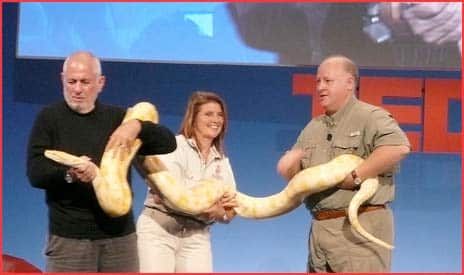
Yesterday, Childhood Obesity News started to explore TEDMED, an organization that arranges an annual conference where all sorts of people talk about the future of medicine. And we do mean all sorts. The 2012 TEDMED Conference list of more than 60 speakers included not only surgeons and diagnosticians, but playwrights, a professional big-wave surfer, the MOMIX dance troupe, a gospel choir, and the Cookie Monster.
Just a minute, is this a medical conference, or a Burning Man festival? Neither, actually. The way Dr. Pritpal S Tamber explains it:
TEDMED wants to help people think. It wants to create an environment where ideas are shared, innovation is showcased, people are encouraged to imagine, and connections are created. It carefully curates not just its stage programme but also its audience, the aim being that up to 50% of both come from outside of health and medicine.
It seems that the goal is not to set up a panel of experts who hand down commandments carved in stone, but to gather a crew of miscellaneous thinkers from various disciplines to hash things out. Such cross-pollination might not be a perfect way to pursue knowledge, but it does cut loose from the top-down dictatorship of medical establishment, which does not always function effectively or achieve optimal results.
TEDMED’s Great Challenges Team is headed by David Ludwig, M.D., Ph.D., who has the reputation of a maverick with many ideas that challenge previously accepted certainties. Some of these are highlighted by Adam Voiland and Angela Haupt in a piece called “10 Things the Food Industry Doesn’t Want You to Know.” They write:
Wellness initiatives are often just marketing ploys, contends David Ludwig, a pediatrician and coauthor of a commentary published in 2008 in the Journal of the American Medical Association (JAMA) that raised questions about whether big food companies can be trusted to help combat obesity. Ultimately, he has argued, makers of popular junk foods have an obligation to stockholders to maximize profits, which means encouraging consumers to eat more — not less — of a company’s products.
Dr. Ludwig is opposed to ultra-processed foods, which remove fiber and micronutrients from food that would have been fine if left alone. He is no fan of the Center for Consumer Freedom and other “astroturf” groups that are covertly run by the junk food industry. His concerns about childhood obesity have led to some unconventional ideas about calories, which hit the news earlier this year via the Journal of the American Medical Association.
For The New York Times, Gary Taubes outlined the backstory:
The calorie-is-a-calorie notion dates to 1878, when the great German nutritionist Max Rubner established what he called the isodynamic law. It was applied to obesity in the early 1900s by another German — Carl Von Noorden, who was of two minds on the subject. One of his theories suggested that common obesity was all about calories in minus calories out; another, that it was about how the body partitions those calories, either for energy or into storage.
Everyone has pretty much gone along with the first Von Noorden theory, but now it looks like obesity might be a fat-storage defect after all. In which case, it’s actually the type of food that counts. While by no means definitive, a study done at Boston Children’s Hospital, which Taube explains in detail, seems to indicate that a low-carbohydrate diet is much more effective for weight loss than a low-fat diet, even if the number of calories consumed is the same.
Is this heresy? Perhaps, but it’s also indicative of the kind of outside-the-envelope thinking encouraged by TEDMED.
Your responses and feedback are welcome!
Source: “TEDMED 2012 Conference,” IStockAnalyst, 03/27/12
Source: “Why TEDMED might be the only health conference worth going to,” Optimising Clinical Knowledge, 10/10/12
Source: “10 Things the Food Industry Doesn’t Want You to Know,” U.S. News & World Report, 03/30/12
Source: “What Really Makes Us Fat,” The New York Times, 07/01/12
Image by hahatango (Aaron “tango” Tang).

 FAQs and Media Requests:
FAQs and Media Requests: 












2 Responses
With a combination of healthy foods and physical activity, I think we can stop the childhood obesity epidemic. The hardest problem is getting everyone involved including parents, schools, and governments.
Thanks for writing in!